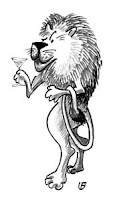|
Word of the Month: Index
I'm reading Helen Macdonald's book Falcon, where she introduces, on the first page of the introduction, our current Word of the Month. It is a term coined by German-born Franz Boas (1858-1942), who is considered the father of American anthropology (pictured at right). The word has two compounds: Kultur ("culture") and Brille ("glasses" or "spectacles"). In Macdonald's words, it's "the invisible mental lens your own culture gives you through which you view the world". The author describes in subsequent chapters how our very human Kulturbrille makes falcons the "repository for human meanings". For Boas, it was important for anthropologists to become aware of their Kulturbrille to prevent them from making biased judgments about the alien cultures they encountered and tried to understand. The same is important for people like us, who increasingly live in a multi-cultural environment. I like the present term because it captures an abstract concept through a very concrete image, a characteristic it shares with other words of the month I have introduced. |
|
Presence Out of Context/Underworld
1 week ago



















